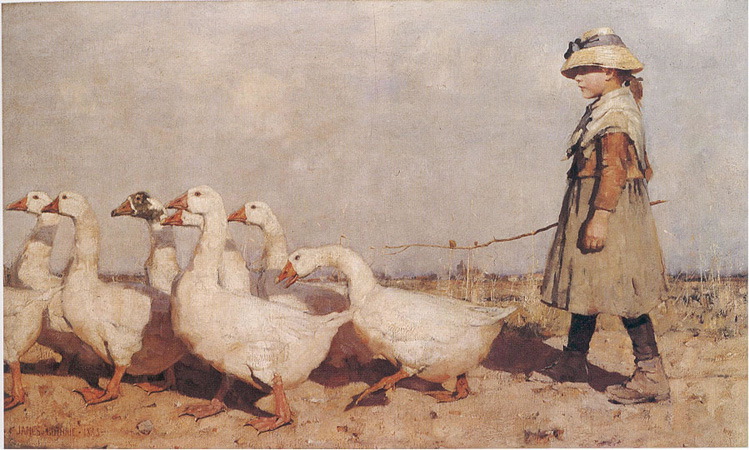
1. Can you describe the narrative voice in the opening sections? What history does it convey? Which historical events can you recognize? What social changes happened in the nineteenth century?
2. What can you make of the speaker's/speakers' viewpoint, his or their political or social views, and his/their attitude toward the neighbors? What kinds of behavior does the speaker dislike? Are his attitudes always consistent?
3. What seem to be the occupations of most of the inhabitants of the Mearns? What buildings and places does the narrator describe, and who lives in each (e. g., the Guthries, Rob of the Mill, Chae and Kristy Strachan, Mrs. Gordon, Mistress Monro, Alec Mutch, etc.)
4. What kind of incidents does the narrator seem to enjoy relating? What kinds of social tensions seem present in the society he describes?
5. What do we learn about Ewan Tavendale (Chris's future husband)? About Blawearie, the Guthrie's home? About the Standing Stones?
6. What are advantages in chosing this narrative voice? What functions does it serve at the beginning of the book? What expectations does it evoke in the reader?
7. What other narrative points of view are presented? Do these viewpoints complement each other?
8. Could you say that this book seems to evoke a compound or plural protagonist, and if so, how does this differ from/resemble earlier books we have read?
9. Are there points at which you can discern the author's viewpoints behind those of the narrator? How can you tell?
10. Why does the narrator end his preface with an allusion to a "house with green shutters"?
11. According to the prefatory note, what was Gibbon's aim in creating the language used in the novel? What are its advantages? Does it remind you of any modernist experiments you have read?
12. Are passages of this book intended to convey stream-of-consciousness? Are they successful?
13. Where is the novel set? In what ways is the geographical location important to the story?
14. Why is the first section called "Ploughing"? Why is it a "Song"?
15. What do we learn about Chris? What split does she experience in her roles and identity? (32)
16. Can you imagine which aspects of Chris's life or of this novel might have been autobiographical?
17. Why do you think the author may have chosen a female for his protagonist? Can you think of other novels by a nineteenth or early twentieth-century male author spoken in a woman's voice?
18. What are some unusual or striking aspects of the way in which she is portrayed? Why do you think some reviewers suspccted the author of the novel might be a woman?
19. What do we learn about the Guthrie family? What economic circumstances do they face? What was Jean Guthrie's background, and what does she teach her daughter to respect? (27) How do she and John Guthrie meet?
20. What precipitates the family's move, and what are its results? What seems to motivate John Guthrie's violence? Is he sympathetically treated?
21. What do we learn about the family's internal dynamics? What major tensions divide John from his family? Who seems especially hurt by the father's behavior?
22. How many children are born, and in what order? What events precipitate the shocking deaths of mother and children? (cmp. Jude the Obscure)
23. What do you think of the tone of the novel's portrayal of the parents' sexual relations? Where do the author's sympathies lie? Can you think of other British/European/American works of this time or earlier which portray similar themes?
24. Why may the Paisley Express have condemned the novel's "unredeemed close-packed filth, meanness, spite, brutality, lying squalor and stupidity"?
25. Why do you think Gibbon included the scene in which the father views his naked daughter? How does Chris react, and how does the mother react after their conversation? What parting words does she offer her daughter?
26. How does John Guthrie respond to the death of his wife? (75) How does Chris respond to the loss of her mother? (63) What does Mrs. Munro suggest when she comes to help with the funeral?
27. What are some notable aspects of Chris' relationship to her father? How does she respond to his advances? To his death?
28. What is the fate of the twins? Why were these chosen to be sent away?
29. How does the novel portray religion and its ministers? What are John Guthrie's religious views? What are the differences between the three ministers who preach a sermon, and on what grounds is the selection made? What do we learn about Mr. Gibbon's consistency of life? (74-75)
30. What social significance seems attached to automobiles? (36)
31. What is the fate of Dafty Andy? Where do the author's sympathies lie, and why do you think this incident was included?
32. What changes occur in will after his mother's death?
33. What is added to the book by its subtitles and arrangment? Could the book be described as an epic, and if so, in what way?
34. What are some circumstances in which Chris experiences a sense of epiphany? (119, 146)
35. What are some features of the novel's prose style? Some repeating sentence patterns? Are there passages which seem especially poetic?
36. How does Gibbon use animal imagery? How are animals portrayed in the book? What aspects of their lives are frequently noted?
37. What seem to be some of the book's underlying values?
38. Who are some important characters outside the Guthrie family? What does each contribute to the narrative?
39. What motivates her marriage to Ewan Tavendale? How is their courtship presented? What are some important features of the wedding scene?
40. What do the couple have in common, and how do they differ? Are they happy?
41. What motivates Ewan to leave his family for war? Why do the other men in the district enlist? Do you think the author believes these motives adequate or wise?
James Guthrie, To Pastures New, 1883
